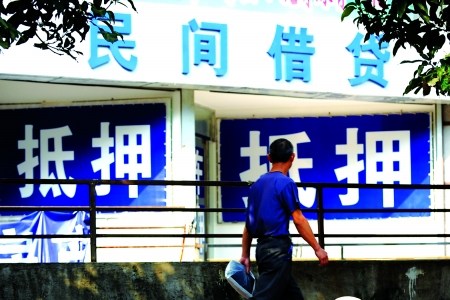(Ecns.cn) -- Loan sharking is nothing special for people in Wenzhou, located in eastern China's Zhejiang Province. Many local people with spare cash admitted that they had done it before. Under the government's tightening monetary policy, state-sanctioned sources cannot satisfy the demands for credit loans, which has resulfted in the prosperity of the unofficial, or black, market.
In provinces such as Zhejiang and Shanxi, where private capital has already formed an active and dynamic market, loan sharks have been hiking up their interest rates in a crazy manner. Apart from the hidden places, pawnshops, consignment shops, and investment companies are all engaged in this business.
Revival of loan sharking
The Wenzhou Supervision Bureau of the China Banking Regulatory Commission (CBRC) conducted a survey in 2008, the results of which showed that the highest annual interest rate of credit loans reached 130% that year.
With the moderately eased monetary policy the following year, the annual interest rate of unofficial credit loans experienced a sharp decline in 2009, dropping to about 15%.
In 2010, this annual interest rate spiked again, reaching an average of 39.19% in unofficial channels.
In 2011, under the tighter monetary policy, black market loans have risen to wide popularity. In the past three months, the annual interest rate of unofficial credit loans hit another historically high record, some even above 180%.
Wenzhou’s loan sharking comes from three sources. One is from relatives and friends. The second is from companies or organizations disguised under other legal fronts, such as pawnshops, consignment shops, bond companies, and investment companies. The third source is underground “banks.”
Illegal interest rates far exceed industry benchmarks
The CBRC revealed that the monthly interest rates for local non-governmental credit hit a record high in Wenzhou. Consignment shops and investment companies offer loans with a monthly interest rate of 6%, which is equal to an annual 72%. Some companies, especially those advertised in newspapers, offer credit loans with a monthly 15% rate, or an annual interest rate up to 180%.
In Qingdao, Shandong Province, monthly interest rates for short-term non-governmental loans regularly exceed 10%, with some loan sharks charging over 20%.
The Guangzhou Investment Corporation revealed that interest rates for unsecured loans in its region average 7 to 10%, whereas official mortgage interest rates average 2.6 to 2.8%. By comparison, monthly interest on loans from credit firms in the Beijing-Tianjin area average 3% to 5%.
In response, the People’s Bank of China (PBC) has threatened a crackdown on unscrupulous lending and that loans greater than four times the PBC interest rate benchmark are defined as usurious.
However, according to a survey of 260 interviewees conducted by the PBC Wenzhou branch, 89% of families and 59.67% of enterprises had engaged in unofficial credit loans. The credit loans are expected to total 180 billion yuan ($27.8 billion USD) in Wenzhou.
High interest rates may trap firms in a vicious debt cycle
It was reported that the major recipients of non-governmental credit loans are small- to medium-sized businesses and real estate companies. Commonly these firms need money to meet turnover demands.
But now exponential interest, common to unofficial loans, is a major threat to small and medium-sized enterprises, as their exposure to risk is much greater. Though new funds may resolve short-term financial difficulties, firms can quickly become trapped in a vicious cycle of debt that undermines long-term fiscal stability.
One cautionary tale is that of Jin Libin, chairman of the Huilong Group in Baotou, Inner Mongolia, who committed suicide due to an unresolved debt of 1.237 billion yuan ($191 million USD).
In a bid to stem the social ills of black market loans, local governments throughout China are likely to strengthen financial supervision in 2011.
"In terms of unofficial credit loans, we should adopt supervision measures as we give them proper space. Supervision is a must, which can prevent risks. But these unofficial channels also play a very important role in providing capital to small- and medium-sized enterprises," said Ba Shusong, government economist with the State Council Development Research Center.


















